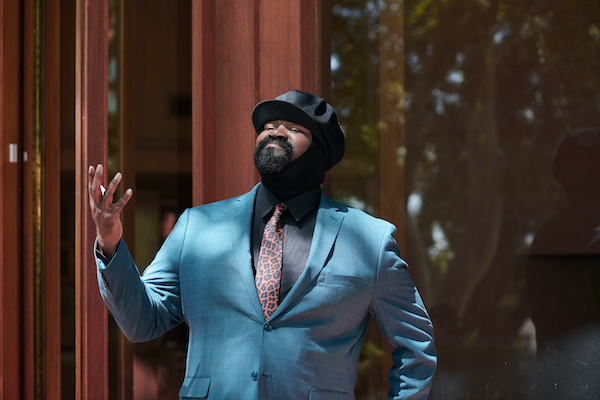Jan 13, 2026 2:09 PM
More Trump-Kennedy Center Cancellations
The fallout from the renaming of the John F. Kennedy Center for the Performing Arts to include President Donald…

“People talk about music therapy, and I find myself thinking, ‘Wow, that’s what I’m doing, in a lot of ways,’” Porter said.
(Photo: Ami Sioux)When considering the artistic legacy of Bakersfield, California, many people think of country music legends Merle Haggard and Buck Owens, and the so-called “Bakersfield Sound.”
Those icons are no longer with us, but Owens’ venue in town, the Crystal Palace, remains in operation. Five years ago, Bakersfield became home to another important, influential musician. Singer Gregory Porter, who grew up in Bakersfield, moved back to town, along with his wife and now 6-year-old son. The family has settled into a spacious, Georgian-style home, situated in a different neighborhood than the one where Porter grew up.
Porter’s musical life began here as a church vocalist before moving to New York and expanding his musical reach to include theater, jazz and soul. A songwriter who craftily inserts references to his life and upbringing, he ends his new album, All Rise (Blue Note), with a specific Bakersfield reference. On the track “Thank You,” Porter describes an epiphany he experienced as a child singing at a Pentecostal tent service “between Lakeview and Haley Street/ That’s where the church would meet.” It seems the higher that Porter’s global profile soars, the more he leans into the roots of his youth.
Just in the past six years, Porter—now 48—has enjoyed a meteoric rise, especially in the infrastructure of jazz, but also spilling into the pop and r&b fields. After releasing two critically acclaimed albums, Water (2011) and Be Good (2012), for the Motéma label, Porter signed to Blue Note and earned Grammy awards for Liquid Spirit (2013) and Take Me To The Alley (2016).
All Rise represents a significant step forward in Porter’s oeuvre, as his most gospel-oriented and most “produced” project yet. It also marks the return of his songwriting voice, after stepping away from original material with a 2017 tribute to a prime influence on Nat King Cole & Me. This latest chapter, a willfully and artfully varied collection of 15 original songs, finds Porter juggling elements of gospel, soul, pop and jazz with tracks featuring the London Symphony Orchestra and horn-section charts woven into the mix.
Producer roles were handled by his longtime ally, Kamau Kenyatta, and Troy Miller, whose multiple talents—as drummer, arranger, producer, and engineer—have made him a powerful aide de camp.
In a phone interview, Miller told DownBeat, “On this record, Gregory wanted to be more open to exploring new things and in typical Gregory fashion—and very deliberately so—left the sessions [open] to spontaneity. That was coupled with having his band there, who have mostly been with him throughout his touring journey. This made for a really creative and communal atmosphere.”
An affable conversationalist, Porter sat down with DownBeat on a cool January afternoon in the cozy context of his dimly lit, wood-lined den. Poised for the release of and promotional touring to support All Rise, he acknowledged that he will face questions about his musical style.
“Maybe my voice goes past genre,” he reflected, “and some of my writing and some of the collaborations and remixes have taken me past the gates of genres. I’m OK with that. I always consider myself a jazz singer, even if I’m singing something that’s not jazz, per se.
“But above that is the message—if it’s a message of irrepressible love or mutual respect or justice or just something insightful about love and life. I really am most concerned about the message, and if the ears are catching it.”

Belá Fleck during an interview with Fredrika Whitfield on CNN.
Jan 13, 2026 2:09 PM
The fallout from the renaming of the John F. Kennedy Center for the Performing Arts to include President Donald…

Peplowski first came to prominence in legacy swing bands, including the final iteration of the Benny Goodman Orchestra, before beginning a solo career in the late 1980s.
Feb 3, 2026 12:10 AM
Ken Peplowski, a clarinetist and tenor saxophonist who straddled the worlds of traditional and modern jazz, died Feb. 2…

The success of Oregon’s first album, 1971’s Music Of Another Present Era, allowed Towner to establish a solo career.
Jan 19, 2026 5:02 PM
Ralph Towner, a guitarist and composer who blended multiple genres, including jazz — and throughout them all remained…

Rico’s Anti-Microbial Instrument Swab
Jan 19, 2026 2:48 PM
With this year’s NAMM Show right around the corner, we can look forward to plenty of new and innovative instruments…

Richie Beirach was particularly renowned for his approach to chromatic harmony, which he used to improvise reharmonizations of originals and standards.
Jan 27, 2026 11:19 AM
Richie Beirach, a pianist and composer who channeled a knowledge of modern classical music into his jazz practice,…